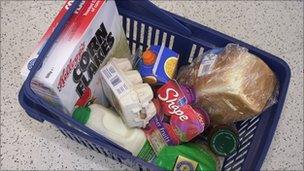'Big rise' in charity food demand, says Fareshare
- Published
- comments

Fareshare passes on surpluses from the food industry to grassroots organisation
Figures from a charity suggest a sharp rise in demand on charities for food.
Fareshare, which redirects food trade surpluses to those in need, said its donations were reaching 35,000 people a day, up from 29,000 a day last year.
The organisation said it had seen the largest annual increase in the number of charities asking for handouts.
Fareshare said low-income families were struggling with rising food prices, and one in three charities it surveyed was facing government funding cuts.
Unprecedented demand
The charity has 17 locations around the UK and passes on good quality supplies from the British food industry to a wide network of organisations such as homeless hostels, women's refuges, day centres and after-school clubs.
It said that in the year to April it provided 8.6 million meals to 600 groups, and this year it was facing unprecedented demand from some 700 organisations.
The organisation, which works with more than 100 companies in the food and drink industry, said 42% of the charities it surveyed reported an increase in demand for food in the past year.
Some 65% of the charities were slashing food budgets in an effort to stay afloat, it found, according to responses from 150 community members from organisations Fareshare supplies.
Fareshare said there has been an "increase in people and the types of people" seeking food from the charities.
In the past, its donations commonly went to homeless people and refugee charities but more "destitute families" were now among its recipients.
Fareshare chief executive Lindsay Boswell said: "At a time of unprecedented demand we want the food industry and the general public to increase their support."
He added: "This research supports the growing anecdotal evidence we've seen in recent months - more people are getting in touch with Fareshare asking for help to access food.
"We're committed to working with grassroots charities to make a significant difference to the diets of people in communities all over the UK but we need more food to meet this increased demand.
"We're asking anyone who works in the food industry in any capacity to look at what is happening to their surplus food and to ask themselves a simple question: 'Could this food stop someone going hungry?'"
- Published26 September 2011
- Published12 September 2011
- Published24 August 2011
- Published24 August 2011
- Published6 August 2011
- Published19 July 2011